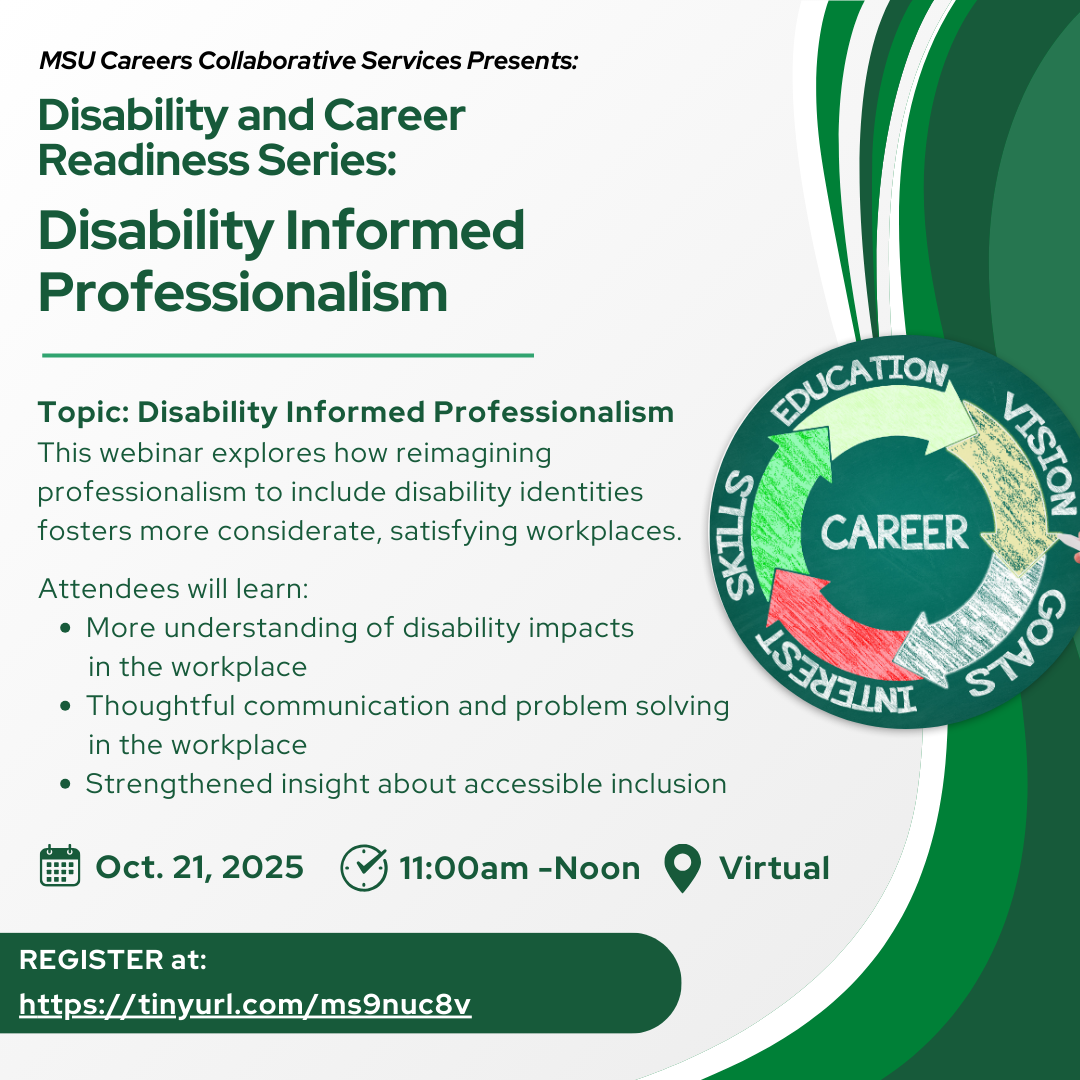Disability Pride Guide
October is Disability Pride Month at Michigan State University! While Disability Pride Month is nationally celebrated in July to honor the signing of the Americans with Disabilities Act, we choose to recognize it in October to ensure that all Spartans can engage with programming.
Join University Health and Wellbeing, Resource Center for Persons with Disabilities, and other campus partners in celebrating and honoring the contributions of the disability community. Together, we can foster a more inclusive campus community.
This guide provides stories, perspectives and resources to learn about disability and our campus community. Submit feedback to inclusion@msu.edu.
The concept of this guide and the identification of its resources is attributed to Access Specialist Colleen Floyd in the Resource Center for Persons with Disabilities, or RCPD. We thank Colleen and RCPD for increasing MSU's understanding of the need to support access for all.
The Office for Civil Rights and Title IX Education and Compliance is pleased to announce the launch of MSU’s Disability and Accessibility Policies Training for faculty and staff on the unversity's legal responsibilities. Learn more
Campus stories
Additional stories
Disability Pride Month events at MSU
MSU alum advocates for developmentally disabled using her MSU education
MSU research wins grants to improve speech therapy for Parkinson's
MSU Libraries celebrates Disability Pride Month with new Sensory Room
MSU pediatric researcher receives NIH Director's Transformative Research Award in neuroscience
MSU hosts event showcasing community advocacy for mental health
MSU students reimagine prosthetics with help from MSU Bikes
MSU faculty member publishes book on creating theatre with neurodiverse audiences in mind
School-based asthma therapy improves student health, lowers medical costs
MSU researcher finds in-person mental health treatment more successful for young patients
Psychologist Henry Cowan awarded for work with people living with schizophrenia in Michigan
AgrAbility is helping MSU AgBioResearch center implement assistive technology to support farmers
Disability Pride Month Collaborations
All October — RCPD Collaboration with Strange Matter Coffee
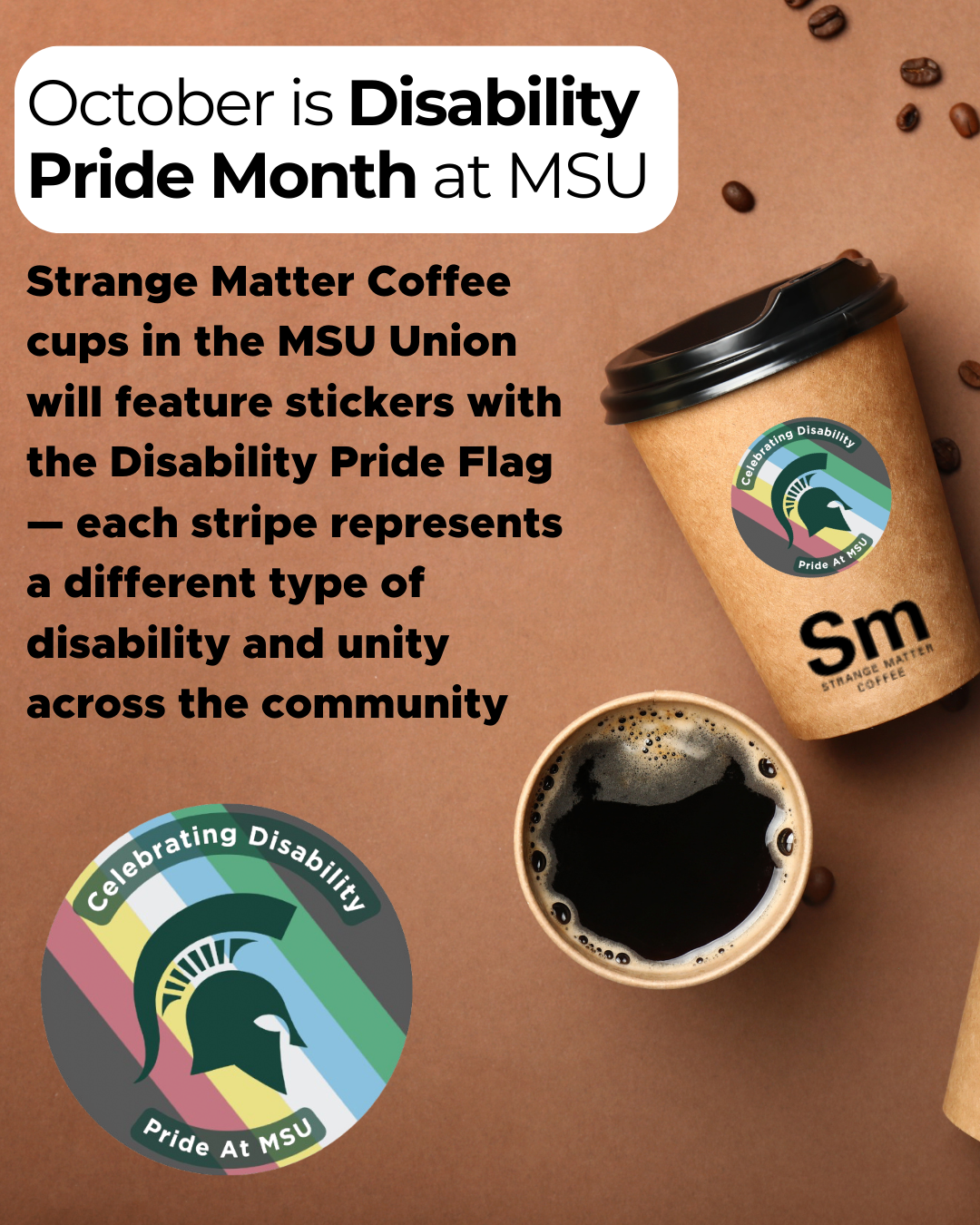
Strange Matter Coffee in the MSU Union is featuring disability pride stickers on their cups this month in collaboration with the Resource Center for Persons with Disabilities to celebrate MSU’s Disability Pride Month.
All October — WKAR Disability Pride Month Feature
WKAR will highlight one composer/performer/conductor with a disability at 10 a.m. and 1 p.m. each weekday during the month of October!
Upcoming events
9/29 - 10/12 — Accessibility & Disabilities Studies book display
From Sept. 29 to Oct. 12, the Main Library lobby will feature an Accessibility & Disabilities Studies book display.
10/3 — Disability Summit Keynote
Please join us for MSU’s 2nd Annual Disability Summit on Friday, Oct. 3, 2025, at the Kellogg Hotel and Conference Center. This year’s summit will be a half-day event featuring keynote speaker, disability advocate, and author Haben Girma, networking opportunities, poster presentations and more. Two hundred copies of Haben Girma’s book, Haben: The Deafblind Woman Who Conquered Harvard Law, will be available to attendees on a first-come, first-served basis, with a book signing opportunity.
In-person attendance is full, but you can watch the keynote virtually by registering for the Disability Summit! To learn more about the Disability Summit, please check out OCR's website.
10/3 — Disability Summit: Virtual Session
Please register for the Disability Summit to get access to the Zoom webinar login information. You can register for webinars up to 8 a.m. on the day of the presentations.
Virtual Presentations:
2 – 2:50 p.m.: Improving Digital Course Accessibility: Insights from Instructors and Designers
3 – 3:50 p.m.: University World Language Instructors' Readiness for Disability Inclusion
10/4 — Adaptive Sports Day
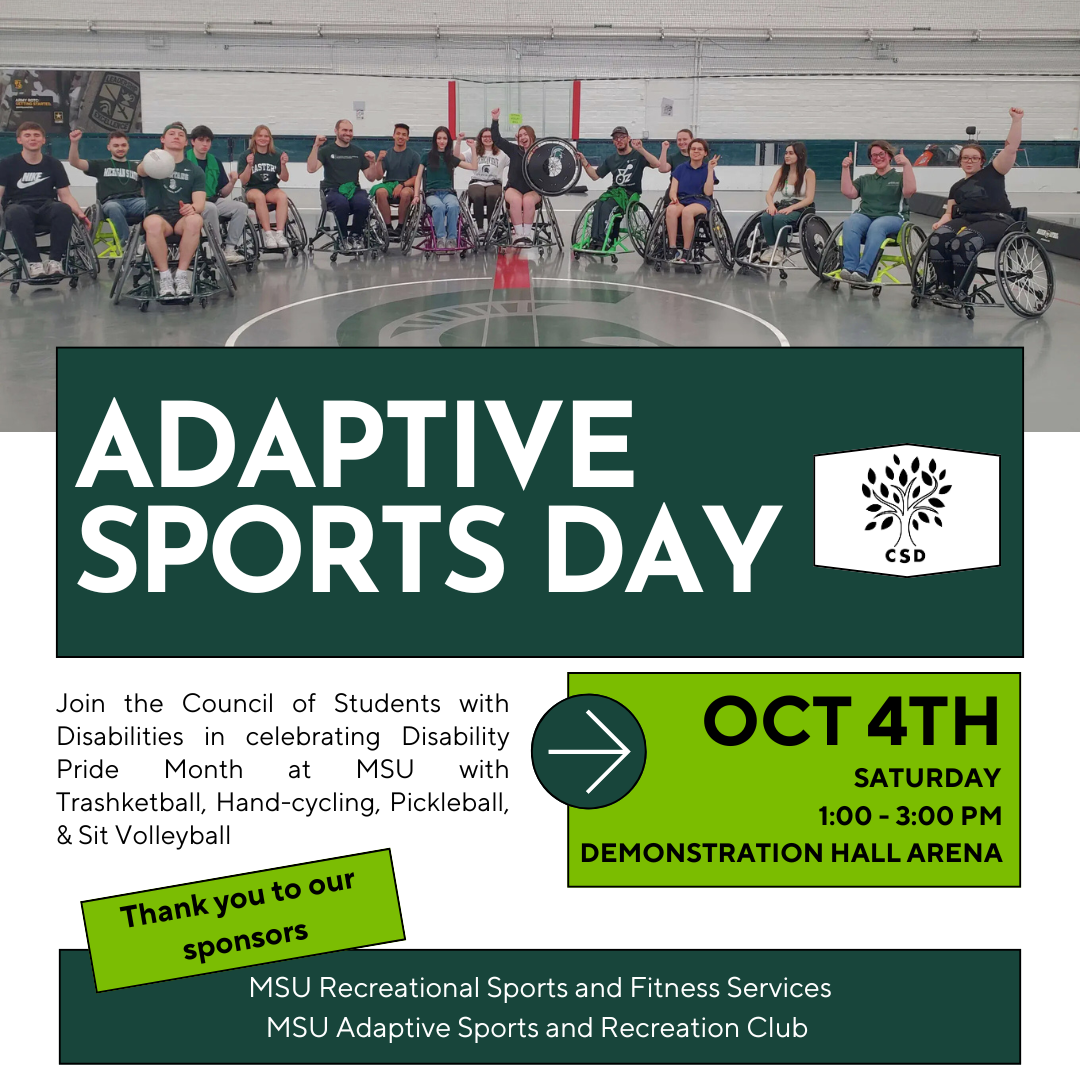
Join the Council of Students with Disabilities in celebrating Disability Pride Month at MSU with Trashketball, Hand-cycling, Pickleball, & Sit Volleyball. Thank you to our sponsors, MSU Reactional Sports and Fitness Services and MSU Adaptive Sports and Recreation Club for making this event possible! We hope to see you on the court in Demonstration Hall Arena on Saturday, Oct. 4, from 1 to 3 p.m.!
10/10 — Disability Summit: Virtual Session
Please register for the Disability Summit to get access to the Zoom webinar login information. You can register for webinars up to 8:00 a.m. on the day of the presentations.
Virtual Presentations:
10 – 10:50 a.m.: Digital Accessibility Tips and Tricks
11 – 11:50 a.m.: Inclusive Labs, Safer Students: The Critical Role of Accessibility & Accommodations and Sensory Experiences at the Libraries
10/13 — MSU Libraries: Sensory Room Open House
Come tour and explore the Libraries’ new Sensory Room on Monday, Oct. 13, from 11 a.m. to 1 p.m. on the 1st floor (room W124) across from the Circulation/Help Desk at the Main Library.
10/14 — Film Screening and Discussion: Change, Not Charity: The Americans with Disabilities Act
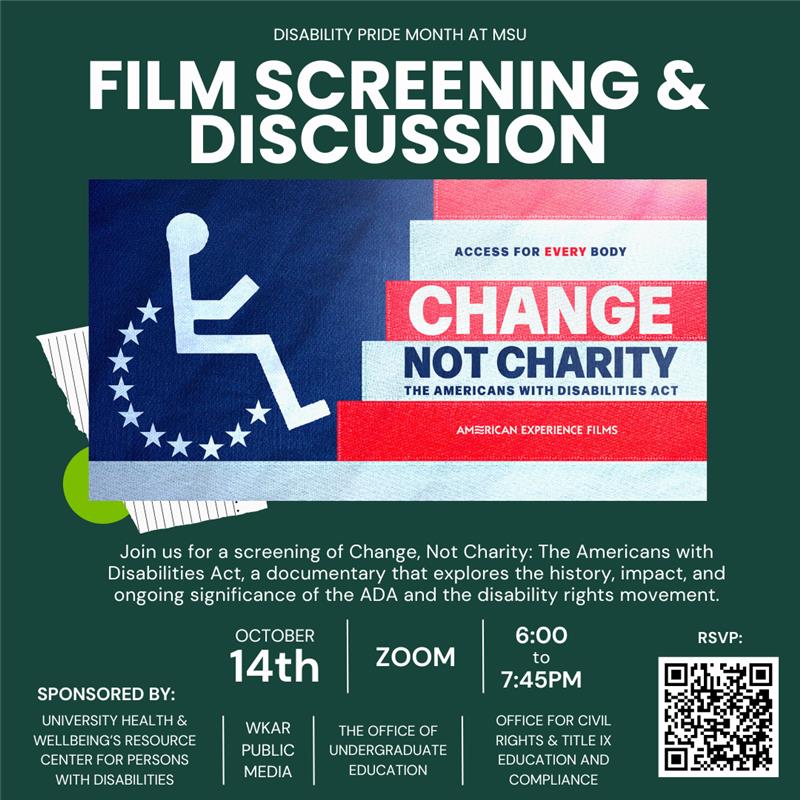
Event now on Zoom! Join us for a screening of Change, Not Charity: The Americans with Disabilities Act, a documentary that explores the history, impact, and ongoing significance of the ADA and the disability rights movement. The film screening and discussion will be held on Tuesday, October 14th from 6 to 7:45 pm via Zoom webinar. Thank you to our event sponsors for making this event possible!
10/15 - Fresh Check Day
Join University Health and Wellbeing in People's Park for this interactive event, promoting mental health awareness and suicide prevention through student-led activities and community connection. Learn more
10/17 — Disability Summit: Virtual Session
Please register for the Disability Summit to get access to the Zoom webinar login information. You can register for webinars up to 8 a.m. on the day of the presentations.
Virtual Presentations:
11 – 11:50 a.m: Hybrid/Flexible Teaching for Improving Student Experience
12 – 12:50 p.m.: Crip Possibilities: Exploring Affinity Spaces
1 – 1:50 p.m.: The Voices in Our Heads: Interrogating and Unsettling Internalized Ableism
10/21 — Disability and Career Readiness Series: Disability Informed Professionalism
The MSU Careers Collaborative is excited to host their October installment of their Disability and Career Readiness Series. This month’s webinar will explore how defining, imagining and preparing for professionalism that includes disability identities and impacts can set everyone up for a considerate and satisfying workplace.
Attendees will learn:
- Increased understanding of disability impacts in the workplace
- Increased consideration for thoughtful communication and problem solving in the workplace
- Increased or strengthened insight about accessible inclusion
Join the Zoom webinar (Passcode: RCPD) on Tuesday, Oct. 21, from 11 a.m. – 12 p.m. Check out Handshake to learn more!
10/23 — MSU Libraries: Sensory Room Open House
On Oct. 23, you can tour the library's new Sensory Room at the Main Library, 1st floor room W124 (across from the Circulation/Help Desk) from 12 - 2 p.m.
10/24 – Alex’s Great State Race
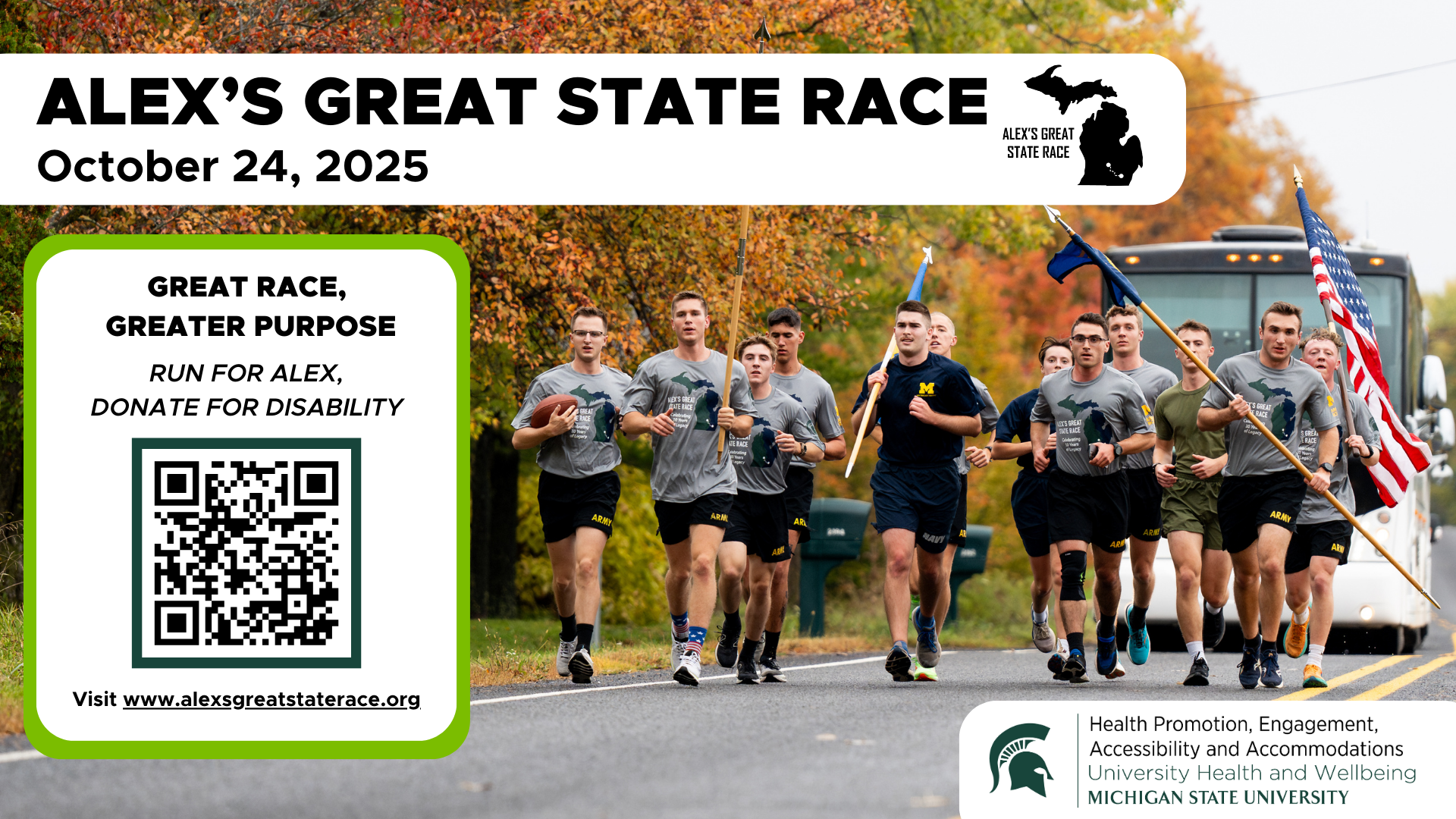
Mark your calendars! On Oct. 24, Alex's Great State Race returns— uniting two rival universities, MSU and U-M, as ROTC cadets run 64-miles through the night, honoring the legacy of Alex Powell, while supporting individuals with disabilities, celebrating a Great Race and Greater Purpose. Learn more on RCPD's website.
10/24 — Disability Summit: Virtual Session
Please register for the Disability Summit to get access to the Zoom webinar login information. You can register for webinars up to 8 a.m. on the day of the presentations.
Virtual Presentations:
10 – 10:50 a.m.: In Our Own Time: Claiming Neurodivergence, Identity, Belonging, and Liberation
11 – 11:50 a.m.: Recovery Happens Here: Centering Student Experiences in Building Inclusive Practices
12 – 12:50 p.m.: Tools with a Purpose: Improve Student Outcomes with Accessible Technologies
1 – 1:50 p.m.: Showcase on Disability Research in STEM at MSU
10/28 – CSD’s Disability Trivia Halloween Extravaganza
Join the Council of Students with Disabilities, Oct. 28 from 6 - 7 p.m. in Bessey Hall room 313, in your best Halloween costume for a night of fall fun and disability trivia. Best costume and trivia winners get campus bragging rights! You’re sure to have a hauntingly good time!
10/29 — Queer Reflections on Horror: A Panel Discussion featuring Contributors from It Came from the Closet
Celebrate the spooky season with an author panel and interactive discussion about horror films, creative writing, and LGBTQIA2S+ identity! The panel features contributors from It Came from the Closet: Queer Reflections on Horror, including Carmen Maria Machado, Addie Tsai, Zefyr Lisowski, and Jude Ellison S. Doyle; topics range from "queer-coding" of villains in the horror genre, body diversity and disability as plot points, visibility of marginalized populations in horror, and more! The event also highlights new texts from the featured authors, including Uncanny Valley Girls: Essays on Horror, Survival, and Love by Zefyr Lisowski (a biographical memoir about mental health, ableism, and cult classics) and DILF: Did I Leave Feminism? by Jude Ellison S. Doyle (an intersectional feminist exploration of marginalized communities and body politics). Attendees will also have an opportunity to receive copies of books by the featured authors and other bookish goodies. Wednesday, Oct. 29, 2025 | 6-8 p.m. | Multicultural Center, Multipurpose Room 1015/1020.
10/30 — Accessibility Work-a-thon
On Oct. 30, from 1 to 3 p.m., a walk-in event in the Main Library Beaumont Instruction Room will take place where faculty and staff can work on improving the digital accessibility of their videos, documents, etc. Accessibility team members from OCR, IT Ed Tech and the Libraries will be available to assist, answer questions and consult.
10/31 – Disability Summit: Virtual Session
Please register for the Disability Summit to get access to the Zoom webinar login information. You can register for webinars up to 8 a.m. on the day of the presentations.
Virtual Presentations:
10 – 10:50 a.m.: Showcase on Disability Research in STEM at MSU
11 – 11:50 a.m.: Transforming Theatre Ensemble presents!
12 – 12:50 p.m.: Disability Inclusion in Grad School: Breaking Barriers as Students & Employees
1 – 1:50 p.m.: Reimagining Disability Access: Fatigue, Hostility and Intimacy in Higher Education
All programs and activities are open to all without restriction or preference based on race, sex, color, ethnicity, national origin or other protected identity.
Disability perspectives
Videos
STRIDE/RCPD student job placement program on campus. To learn more, check out the Building Opportunities for Spartan Success.
My Body Doesn't Oppress Me, Society Does
I'm Not Your Inspiration, Thank You Very Much
Podcasts
Disability Visibility hosted by Alice Wong
Disability Activist and Media Maker Alice Wong talks about life through a disabled lens. The podcast features conversations on politics, culture and media with disabled people.
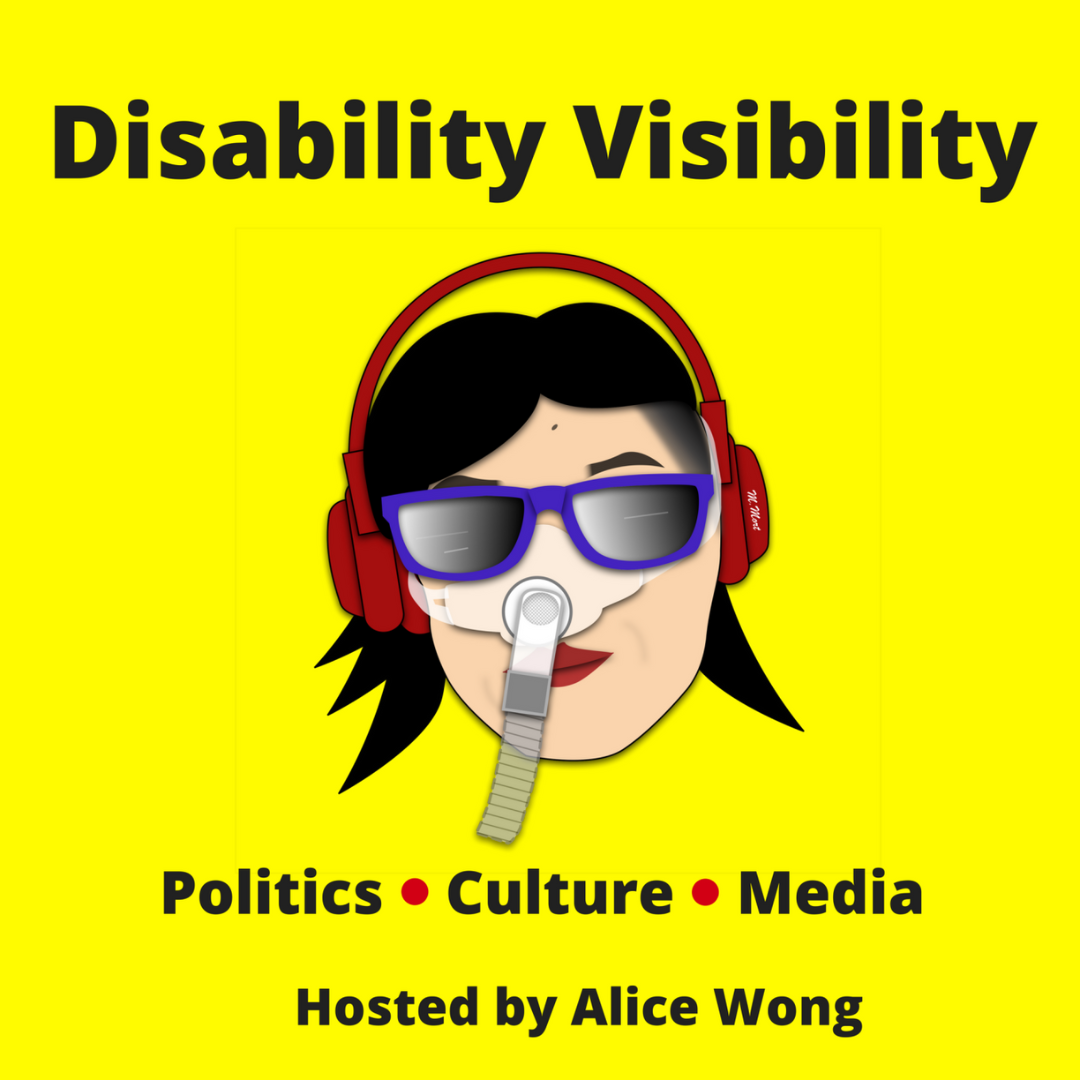
The Loudest Girl in the World hosted by Lauren Ober
Host and Producer Lauren Ober shares the understanding and journey of what it means to be on the autism spectrum, and how to navigate life as a newly diagnosed autistic person.
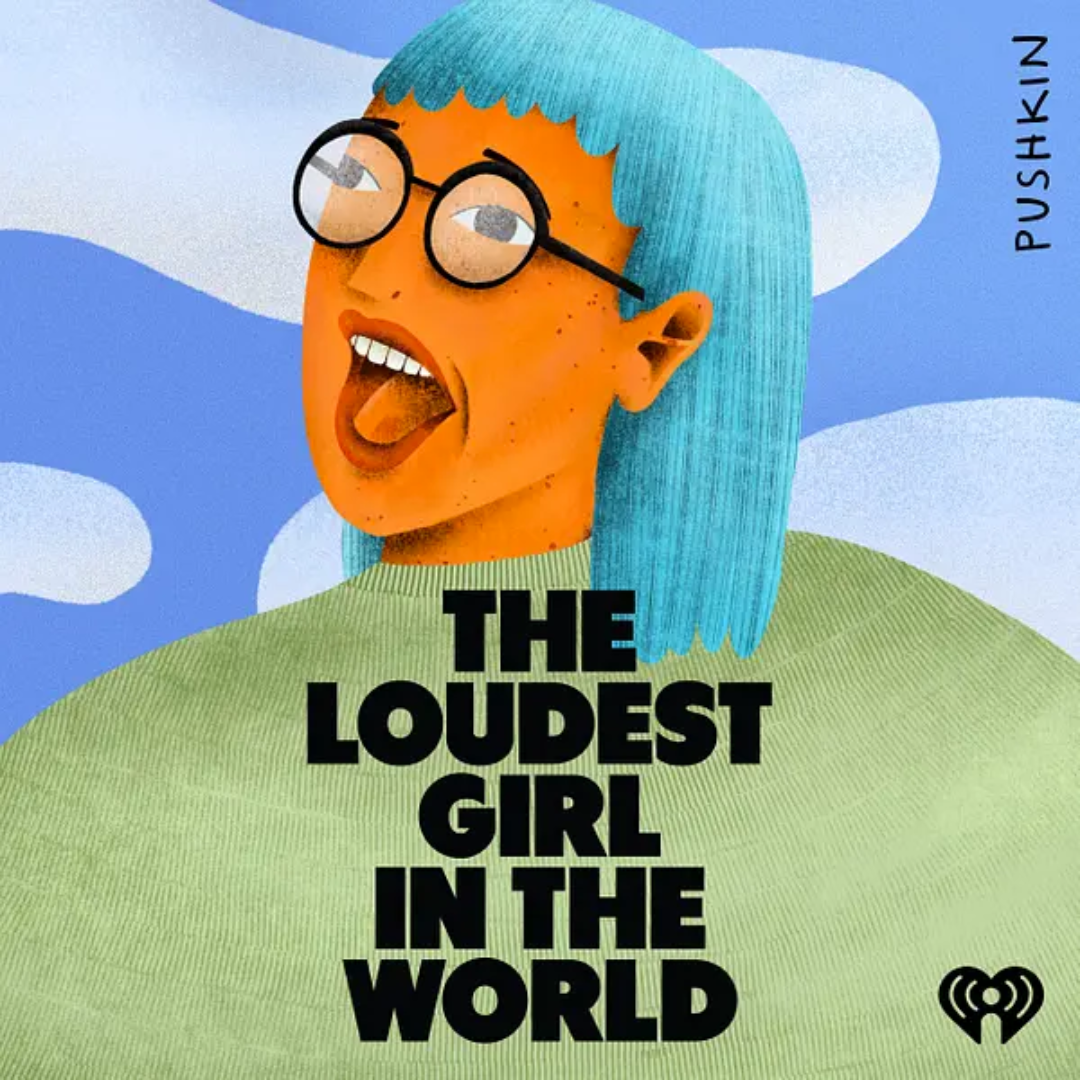
Books
Disability Visibility: First Person Stories from the 21st Century, edited by Alice Wong
As a collection of contemporary essays written by disabled people, this book brings the conversation of disability justice to the forefront and explores the urgency and importance of being represented in the media.
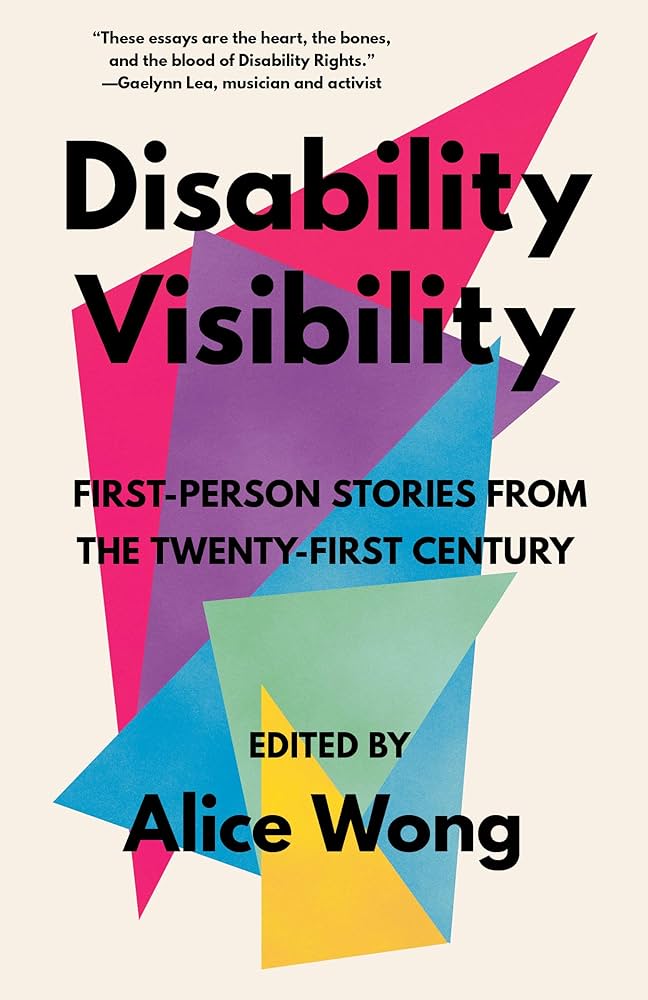
Ways to get involved
Council of Students with Disabilities
CSD is an undergraduate student organization at MSU for students with disabilities and their support system that focuses on awareness, advocacy and support. The group strives to empower students with disabilities by offering a safe and welcoming environment where conversations can be had about concerns, experiences and ideas. The CSD hosts meetings throughout the semester as well as engaging and accessibility events. This fall, the group meets on Tuesdays from 6-7 p.m. in Bessey Hall Rm 114. Find more information on their Instagram.
Alex Powell Spartan Experience Leadership Endowment
Alex’s Great State Race occurs each year in honor of Alex Powell to raise money to support students with disabilities. Proceeds from the race support the Alex Powell Spartan Experience Leadership Endowment, which provides funding for professional development focused on capacity and specialized assistance to those facing challenges around difficult disability dynamics. To donate and learn more, visit the giving page.
Accessibility on campus
Learn more about digital accessibility to help remove barriers at MSU
Accessible Design helps to remove barriers when it comes to internet usage as a way to ensure the success of internet users. MSU provides resources, training and guidance on the Accessibility and Universal Design website.
Inclusive restrooms on campus
MSU has restrooms on campus designed for single-occupancy. Students, employees and visitors may use restrooms that correspond with their gender identity. There is a map that provides the locations of accessible and inclusive restrooms throughout campus, with instructions on how to differentiate between the various types of bathrooms available.
Outreach services to support employee readiness
The STRIDE Center provides various outreach services to ensure and support employee readiness. Each of the programs focus on accommodation and training, which can be found on the STRIDE website.
Disability and Reasonable Accommodation Policy
MSU is committed to full inclusion of persons with disabilities. To ensure that inclusion is supported and incorporated on campus, the Office for Civil Rights and Title IX Education and Compliance created a Disability and Reasonable Accommodation Policy.
Tools and support
Disability and accommodation training (Resource Center for Persons with Disabilities)
The self-enroll D2L course, RCPD Disability and Accommodation Training, helps MSU instructional staff become more informed about the experiences of disabled students and improve their effectiveness with facilitating accommodations. Using text, videos and resources from various disability scholars and activists, the course covers disability education, RCPD office and accommodation information and accessibility best practices.
Assistive technology support
RCPD Assistant Director of Assisitive Technology Innovation Tyler Smeltekop is available to meet with students to help with Assistive Technology by appointment both in person and virtually. Connect with him via email to set up an appointment (smeltek5@msu.edu).
Assignment tracker
The Assignment Tracker is a tool that can be used to input homework, projects and other assignments from your classes to have them organized by their due date. This template can be copied and used for future semesters.
Tower Guard support
Tower Guard is a second-year student organization that volunteers with RCPD to support all students in an effort to make MSU a more accessibility community. Students can complete this form to submit a request and be matched with a Tower Guard member.
MSU places and spaces
Resource Center for Persons with Disabilities
The Resource Center for Persons with Disabilities, or RCPD, was created as a response for equal access to a university education for all students. The center strives to create a welcoming environment, fortify capacity and compassionately challenge each person to reach their fullest ability. Team RCPD assists students, employees and visitors with resources that build a community of opportunity through a variety of sources.
Department of Communicative Sciences and Disorders
The Department of Communicative Sciences and Disorders in the College of Communication Arts and Sciences seeks to advance the understanding of speech, language, voice, swallowing and hearing. They strive to translate scientific discovery to improve diagnostic and treatment approaches for individuals with disorders through cultivating knowledge. The department offers a masters and doctoral degree, as well as several undergraduate preparatory classes.
STRIDE
STRIDE is a Center designed to support and train underserved people with disabilities, their families and other community stakeholders. The Center aims to provide training, conduct research, engage with communities and fulfill the land-grant missions of MSU. STRIDE offers a variety of services and programs to help aid in creating a more accessible community.
Office of the ADA Coordinator
The Office of the Americans with Disabilities Act Coordinator facilitates MSU’s compliance with its Disability and Reasonable Accommodation, Anti-Discrimination and Web Accessibility policies, as well as the Rehabilitation Act of 1973, the Americans with Disabilities Act of 1990, the Americans with Disabilities Act Amendments Act of 2008, Michigan’s Persons with Disabilities Act of 1975 and other laws and regulations prohibiting disability discrimination and harassment. In addition, the office oversees the Presidents Advisory Committee on Disability Issues that ensures broad institutional input on matters relating to persons with disabilities of all characteristics at MSU.
Department of Counseling, Educational Psychology and Special Education
CEPSE is a department within the College of Education, and is dedicated to the study of human learning and development in individuals. The department has five program areas of different levels and modes of study with the opportunity to learn and collaborate across disciplines.
Master of Arts in Rehabilitation Counseling Program
The College of Education offers a Master of Arts in Rehabilitation Counseling Program offers opportunities to advance expertise in the areas of counseling, the social and psychological aspects of disability, the vocational rehabilitation process, case management, ethical practices, independent living, disability management, transition from school to work, vocational assessment, career development and employment strategies. The degree program is dedicated to preparation and promotion in effective delivery of rehabilitation services to individuals with disabilities.
Spaces
- Multicultural Center centers universal design
- MSU Libraries' Sensory Room
- Breslin Center Family Sensory Room
- Bessey Hall multi-sensory patio
Student organizations
Council of Students with Disabilities (CSD)
Graduate Student Accessibility and Support Network (GSASN)
Spartan Alliance for Disability Inclusion and Equity (SADIE)
Additional resources
Digital accessibility training
Join the conversation
@MSUCSD
View this profile on Instagram


